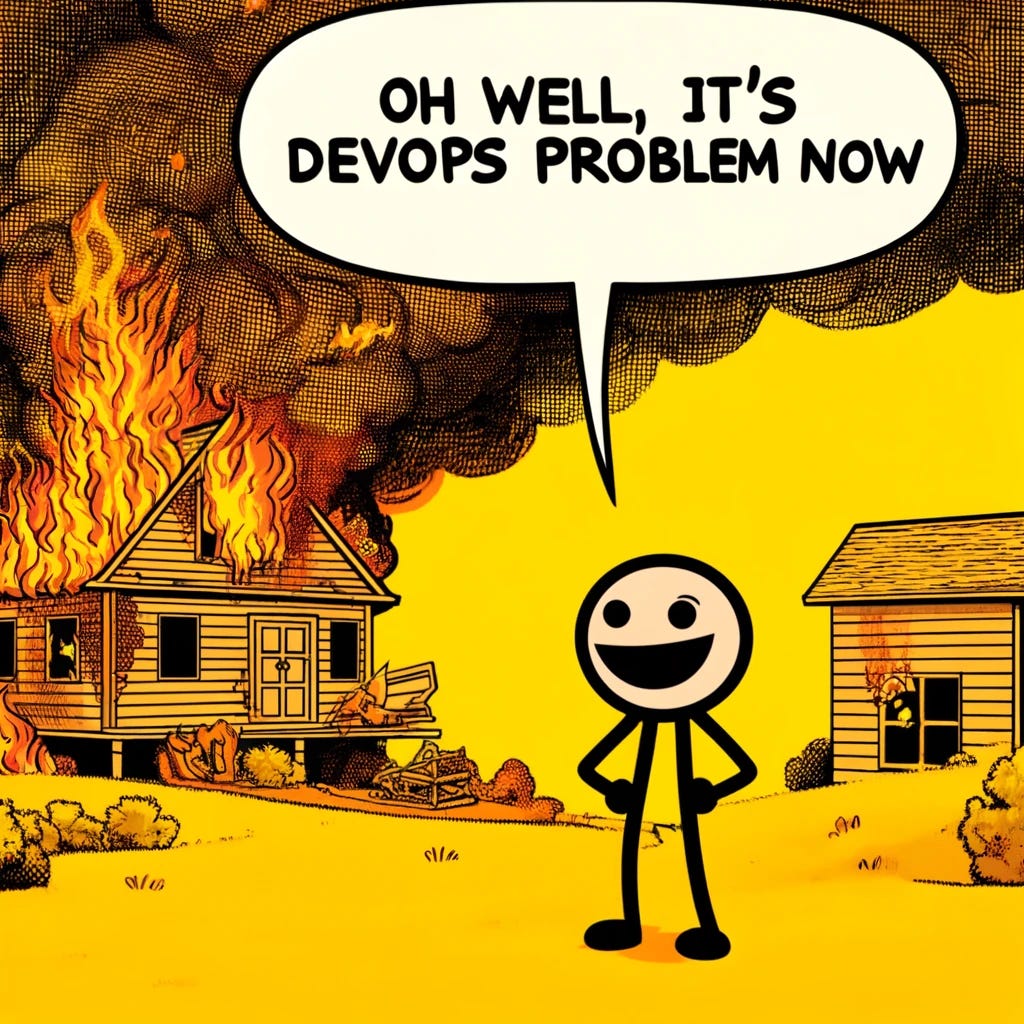A Startup’s Guide to Winning Over Tech's Toughest Crowd - Developers
Developers, they're a breed apart. And yes, they can sniff out marketing fluff from a mile away.
Marketing to developers has been one of the biggest challenges I've faced in my marketing career. In this post, I'll share some insights into the developer mindset and offer practical tips to help you engage with this tough crowd.
First, let's put things into perspective: in a world of 8 billion people, only around 27 million are software developers – this mere 0.3% – wield a disproportionate influence over our daily lives. From smartphones to critical infrastructure, their code shapes our reality. It's mind-boggling to think that such a small group of people holds the key to our digital age!
For B2B businesses, cracking the code of developer marketing is no longer optional – it's a matter of survival. In an era where software is eating the world, the decisions made by this elite group can make or break the success of a product or service in the tech industry. It's a high-stakes game, and the rules are anything but clear.
Decoding the Developer <Mindset/>
Without channeling my inner David Attenborough, understanding developers requires a dive into their values and thought processes.
Imagine you're a startup founder ready to launch a game-changing product. The twist? Your audience isn't the usual corporate crowd but skeptical, influential developers.
Marketing to developers is like playing a complex strategy game against experienced players. In casual gaming (regular marketing), you can use flashy graphics, catchy slogans, and broad appeals to attract players. They might engage with your game briefly and then move on.
However, marketing to developers is more like an intense, multiplayer strategy game (think Starcraft or Chess). Developers have high standards, deep knowledge, and a low tolerance for gimmicks or insincerity. To win them over, you need to provide real value, be authentic and transparent, and earn their trust over time.
Building a Developer-Friendly Brand
Now that you understand their perspective, let's talk about your brand. Does it resonate with a tech-savvy audience? If it doesn't, maybe it's time for a refresh to ensure developers know they're your main focus.
Remember, your brand is more than just your logo – it's your startup’s personality. To win over developers, your brand should radiate authenticity, expertise, and innovation.
Keep your messaging clear and honest, highlighting your technical chops and your involvement in the developer community. Genuine engagement is key to building trust with developers.
Integrating Developer Marketing
Encourage collaboration across your marketing, product, and engineering teams. Blending developer marketing into your broader strategy is vital for impactful campaigns. Start with clear objectives and explore how developer-focused initiatives can improve your overall marketing efforts.
For example, when you launch a new feature, why not produce in-depth technical content, host webinars, or offer exclusive beta access to key developer groups? This approach should work in harmony with your main product launch.
Technical Blogging by Engineers, Not Marketers
Here's a tip: let your engineers do the talking. Content penned by those on the tech front lines resonates deeply because it's grounded in reality.
Share stories about complex challenges they've tackled or new technologies they're exploring. Genuine, technically detailed blog posts will connect better with other developers than any polished marketing attempt. Plus, it means less legwork for your marketing team 😊
Successful examples:
Netflix’s tech bog is renowned for its engineering excellence, and their tech blog is a treasure trove of valuable content for technical audiences. One example is "Reverse Searching Netflix’s Federated Graph," written by software engineers Ricky Gardiner, Alex Hutter, and Katie Lefevre.
Airbnb's engineering team is known for their high-quality blog posts, which cover a wide range of topics related to their technology stack and engineering practices. A standout post is "Chronon, Airbnb’s ML Feature Platform, Is Now Open Source" written by engineer Varant Zanoyan.
Host Hackathons and Coding Challenges
Why not show off your commitment to innovation by organising a hackathon that challenges developers to build applications or features that integrate with your startup's platform or API.
Facebook's internal hackathons became legendary in the tech world. They regularly host these events to encourage their teams to collaborate, experiment with new ideas, and build new projects. Many of Facebook's most popular features, such as the "Like" button, Facebook Chat, and even the initial version of their mobile app, were born out of these hackathons.
Here is Facebook's CTO Andrew Bosworth talking about these hackathons:
Embrace Negative Feedback
It might seem a bit backward, but embrace your negative feedback. Developers respect transparency and dedication to improvement.
Coinbase, faced significant backlash from users due to slow performance, downtime, and account access issues during the Bitcoin boom. CEO Brian Armstrong publicly addressed the negative feedback in a blog post, acknowledging the problems and outlining steps to improve.
By being transparent and proactive in addressing the issues, Coinbase demonstrated their commitment to customer satisfaction and continuous improvement, helping to restore trust among their user base despite the challenges faced.
Think Beyond Traditional Swag
Forget the usual t-shirts and stickers. How about giving away something developers truly value, like software tools or subscriptions?
For example, a subscription to GitHub Pro could be a game-changer for many developers. Providing AWS Credits can also be incredibly beneficial as these credits allow developers to freely explore and utilise AWS's vast suite of cloud services without the initial cost barrier.
Open Source Contributions
Engaging with and contributing to relevant open-source projects can be a powerful way to build credibility and trust within the developer community. Consider highlighting how your startup actively participates in and supports open-source initiatives.
Sponsor Developer Side Projects
Many developers work on side projects to explore new technologies or solve interesting problems. By offering sponsorships, you can encourage them to use your products or services in their projects, increasing visibility and user adoption in a very organic way.
Engage on Reddit
Reddit users, particularly those in developer communities like r/programming and r/webdev, prioritise genuine engagement. So, when you jump into discussions on Reddit, focus on being helpful and informative, not just on pushing your product.
Brave, the privacy-focused web browser startup, has effectively engaged with developer communities on Reddit. Co-founder and CEO Brendan Eich actively participates in discussions on subreddits like r/brave_browser, r/privacy, and r/technology, providing helpful insights and addressing concerns about Brave's privacy features and business model.
Localised Developer Engagement
If your startup targets developers globally, consider tailoring your marketing efforts to specific regions or languages. This can involve creating localised content, participating in regional developer events, or partnering with local developer communities.
Use Humor and Memes Appropriately
Humor can be tricky, but if you nail it—think inside jokes about programming languages—it can make your brand super relatable. However, it’s crucial that this humor is genuine and well-informed to avoid backfiring.
Swag with a Purpose
While developers might not fall for traditional marketing gimmicks, there's one thing that can make their hearts skip a beat: good swag. Developers love practical, high-quality branded merchandise that they can use in their daily lives.
Companies like Google and GitHub have mastered the art of creating memorable and useful developer swag, setting a great example for startups looking to make an impression on this unique audience.
However, think beyond the usual t-shirts and stickers. Consider items like custom-printed keyboards, smart coffee mugs, or even code-themed board games.
Measuring Developer Marketing Efforts
Some common KPIs might include:
- Developer sign-ups and activations
- API usage and adoption rates
- Documentation and tutorial engagement
- Open-source contributions and collaborations
- Developer churn rate
Use tools like Google Analytics, Mixpanel, or Amplitude to monitor your website, app and product usage, and keep a close eye on your social media and community metrics.
Conclusion:
Marketing to developers is a unique challenge that requires a deep understanding of their mindset, values, and preferences.
Remember to:
Build a developer-friendly brand that radiates authenticity, expertise, and innovation.
Create high-quality, technical content that developers love.
Build a community of loyal users who become passionate advocates for your brand.
Engage with developers on their preferred platforms, such as Reddit, and contribute to open-source projects.
Offer practical and memorable swag that developers will genuinely appreciate and use.
In the world of startup marketing, it’s about daring to go where no marketer has gone before.
Live long and prosper! 🖖











This makes me wonder what the next phase of phase of technology AI will do. It population may not even be up 0.0001 of the square feet of the earth but they will do alot of things